Feature STORY
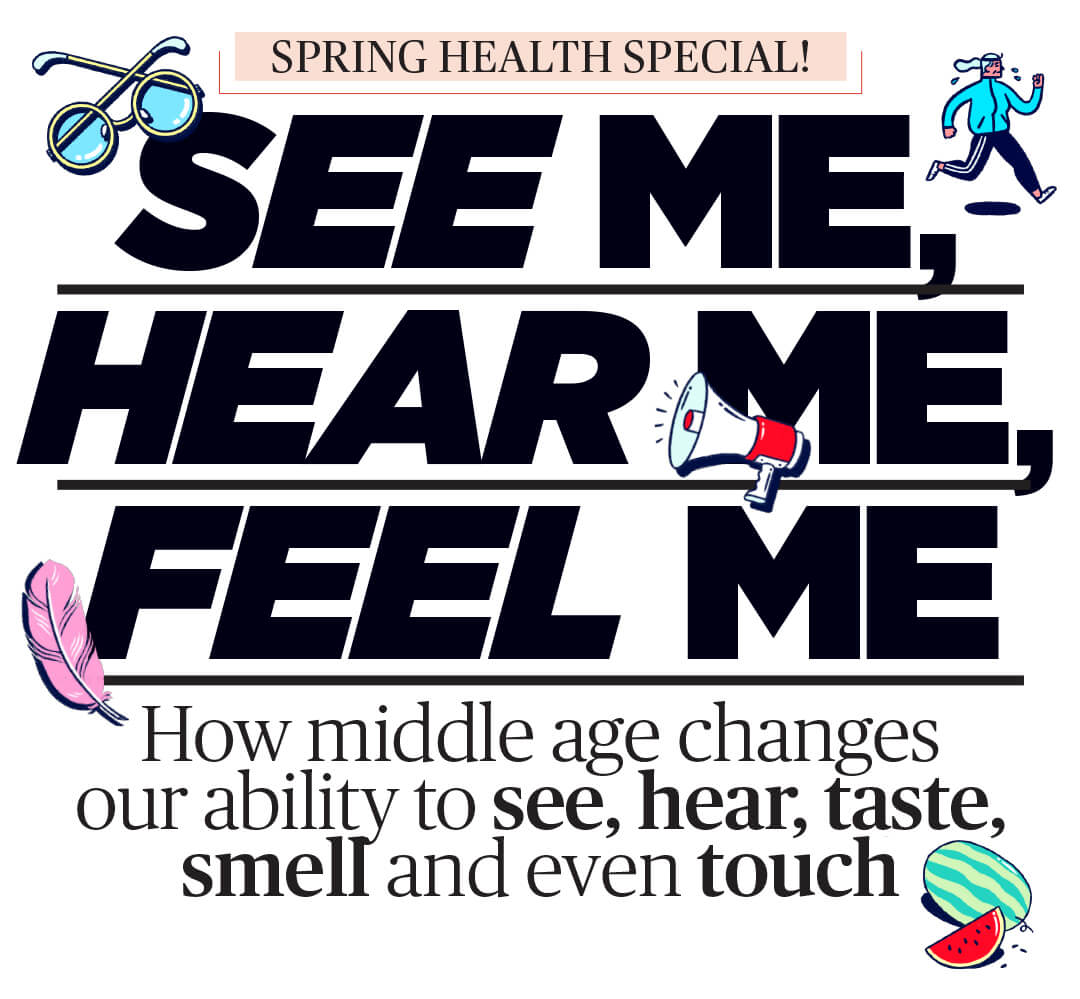
By Nicole Pajer
PHOTOGRAPHY BY GREGORY REID
ILLUSTRATIONS BY JOSIE NORTON
BY THE TIME we hit our mid-50s, about 8 in 10 of us will have noticed at least one significant change in how we see the world: It’s become harder to read small type.
For many of us, that change in our sight—a result of presbyopia, a stiffening of the eye’s lens that makes it harder to change focus—might be the first time our age has affected our quality of life. But it should also be a wake-up call about protecting the delicate systems that give us our sight, hearing, touch, smell and taste. More than half of people ages 57 to 64 will have measurable impairment in two or more of these senses, one study suggests.
And while much of the decline in our senses can be slowed or stopped with early detection and treatment, the damage we sustain usually can’t be reversed. We consulted some of the leaders in research and treatment to uncover what’s really happening to our ability to sense the world, and what we can do to protect it and ensure that we're enjoying life to its fullest for years to come.
VISION
HOW TO SEE YOUR FUTURE MORE CLEARLY

“I FIRST NOTICED the change two months ago,” says Shavon Jones, 51, of Miami. She was attempting to read the label on her mother’s medication. “It took what seemed like minutes to read a single pill bottle,” she says.
Difficulty reading small type is often the first change in our vision that we notice as we round the corner of age 50. But it’s certainly not the only one.
What to Expect in Your 50s:
“IT’S A MYTH that as you get older, you should expect to lose vision,” says Christina Y. Weng, M.D., fellowship program director of Vitreoretinal Diseases & Surgery at the Baylor College of Medicine Cullen Eye Institute in Houston. While age-related changes occur and the risk of adverse eye conditions increases, regular monitoring and timely treatments can help most of us protect our sight well into our later years. Here’s what to expect:
→ Close reading gets harder. Presbyopia (from a Greek term meaning “old eye”) is a stiffening of the lenses that makes it harder to focus on close-up tasks, says Chantal Cousineau-Krieger, M.D., an ophthalmologist at the National Eye Institute. Reading glasses or multifocal lenses are the obvious solutions. Surgery such as monovision LASIK is an option, although any permanent change in vision can have unintended side effects, like altered depth perception. And while there are eye drops that reduce your pupil size and can help your eyes focus up close for up to six hours, they, too, have potential downsides, including red eye, headaches and reduced night vision. Cousineau-Krieger offers her own hack for reading small type: Snap a photo of it on your smartphone, then zoom in.
“VIRTUALLY EVERYONE OVER 55 HAS SOME DEGREE OF EYE DRYNESS.”
—Alan Carlson, M.D., Duke University
→ Our eyes get dry. Among the changes that come with menopause are hormonal shifts that can contribute to dry eye syndrome, in which the eyes don’t produce enough tears or tears evaporate too quickly. But dry eye isn’t limited to women at midlife: “Virtually everyone over 55 has some degree of dryness,” says Alan Carlson, M.D., professor of ophthalmology at Duke University School of Medicine in Durham, North Carolina. Spending time on our phones and computers can worsen the condition, since we tend to blink less when we’re staring at a screen. Over-the-counter eye drops—and in some cases prescription medications—can help, as can avoiding air in your eyes from fans or air conditioners. Take breaks from the screen, drink plenty of fluids, and consider using a humidifier in both your home and office. Sunglasses help because both wind and sunlight can cause the fluid in your eyes to evaporate faster than it can be replaced. Ask your doctor to check your medications, as antihistamines and blood pressure drugs may also contribute to dry eyes.
REGULAR VISION SCREENING CAN CATCH DISEASES LIKE AMD EARLY.
→ Our vision may get cloudy. With age, proteins break down in the lens of the eye, causing them to clump together and form cloudy areas called cataracts. At least 1 in 10 people may have some cataract-related vision issues in their 50s. Cataracts tend to grow slowly, and symptoms may be easy to ignore until they significantly affect vision, so see your eye care provider regularly. The good news is that cataracts can be corrected with a common outpatient procedure.
→ It gets harder to see at night. As we grow older, we begin to lose our eyes’ photoreceptors, called rods, that enable us to see in low light; at the same time, the muscles that control our pupils weaken, causing the pupils to get smaller. By age 50, we may need twice as much light to see when it’s dim than we did in our 30s.
→ Our vision may get spotty, too. As the jellylike fluid that fills the eye breaks down with age, spots in your vision called floaters can appear. They are typically harmless, says Natasha Herz, M.D., a clinical spokesperson for the American Academy of Ophthalmology. But if you notice a sudden onset of a cloud of floaters, get checked out immediately for a retinal tear or detachment, which would need to be repaired within 24 to 48 hours to prevent permanent damage to your vision.
→ Our risk of eye disease increases. After Scott Gordon turned 50, he began noticing it was hard to read and work on the computer. “Words are blurry, and it takes me much longer to read things,” he says. Gordon’s ophthalmologist found he was experiencing symptoms of wet age-related macular degeneration (AMD). With wet AMD, abnormal blood vessels leak fluid or blood into the part of the retina known as the macula, which degrades vision. So Gordon, now 60, receives injections into his eyes every four months in an effort to save his sight. Still, for this active Chicago-based telehealth chief medical officer, AMD is already having a negative effect. “I'm a runner, and I’ve fallen a few times on runs since my depth perception has been so impacted,” says Gordon.
One in 10 Americans have signs of early AMD in their 50s. In addition to wet AMD, there’s dry AMD, the progression of which may be slowed by a specific blend of vitamins and minerals called AREDS2 (although studies have not shown that taking them early can prevent AMD). Glaucoma, which can lead to blindness from optic nerve damage, most commonly affects people in their 60s and beyond but can happen to people of all ages and is often asymptomatic. Regular vision screening can catch it early, which is crucial to stopping its progression.
Protect Your Eyes
Take a good look at these tips for saving your vision
NOW

If you’re still smoking, quit. Smokers are two to three times more likely to develop cataracts and up to four times more likely to develop AMD than nonsmokers. Call 800-QUIT-NOW for help.
DAILY

Wear sunglasses or a wide-brimmed hat outdoors. It’s estimated that at least 15 million people worldwide are blind from cataracts; of these, approximately 10 percent may be due to UV exposure. Sunlight can also exacerbate AMD and even put you at risk for skin cancer in the eye.
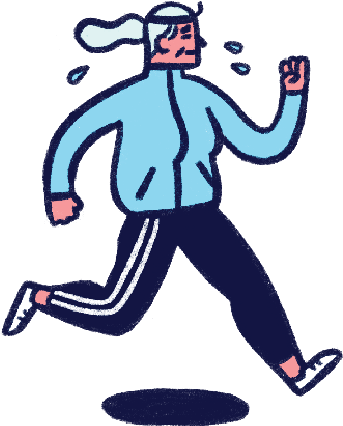
Get moving. Getting your heart pumping and more oxygen and blood flow to your eyes can reduce your risk of glaucoma by up to 73 percent.

Eat your veggies. A 2024 study showed that eating even a moderate amount of leafy green vegetables (at least 2.7 servings a week) slowed the progression of age-related macular degeneration.
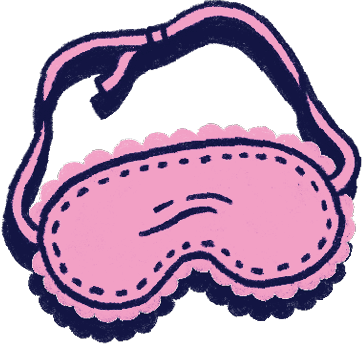
Prioritize sleep. Even one night of poor sleep can cause reduced tear production that could exacerbate dry eye.
Control your blood sugar. Diabetes can lead to vision issues, but with monitoring, they can be treated and sometimes even reversed.
YEARLY
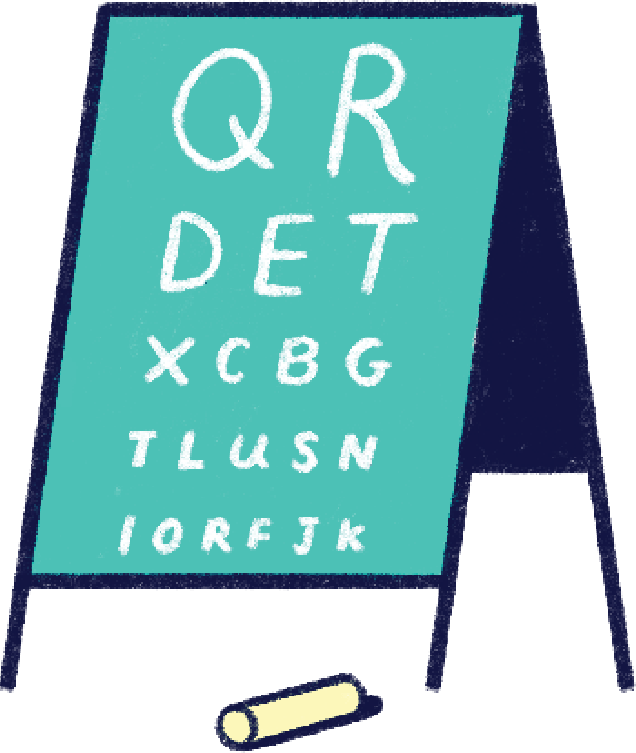
Get a comprehensive eye exam. That means having your eyes dilated and examined—not just checking your prescription for glasses. [The American Optometric Association suggests having this done at least every one or two years.]
HEARING
LISTEN TODAY, HEAR BETTER TOMORROW
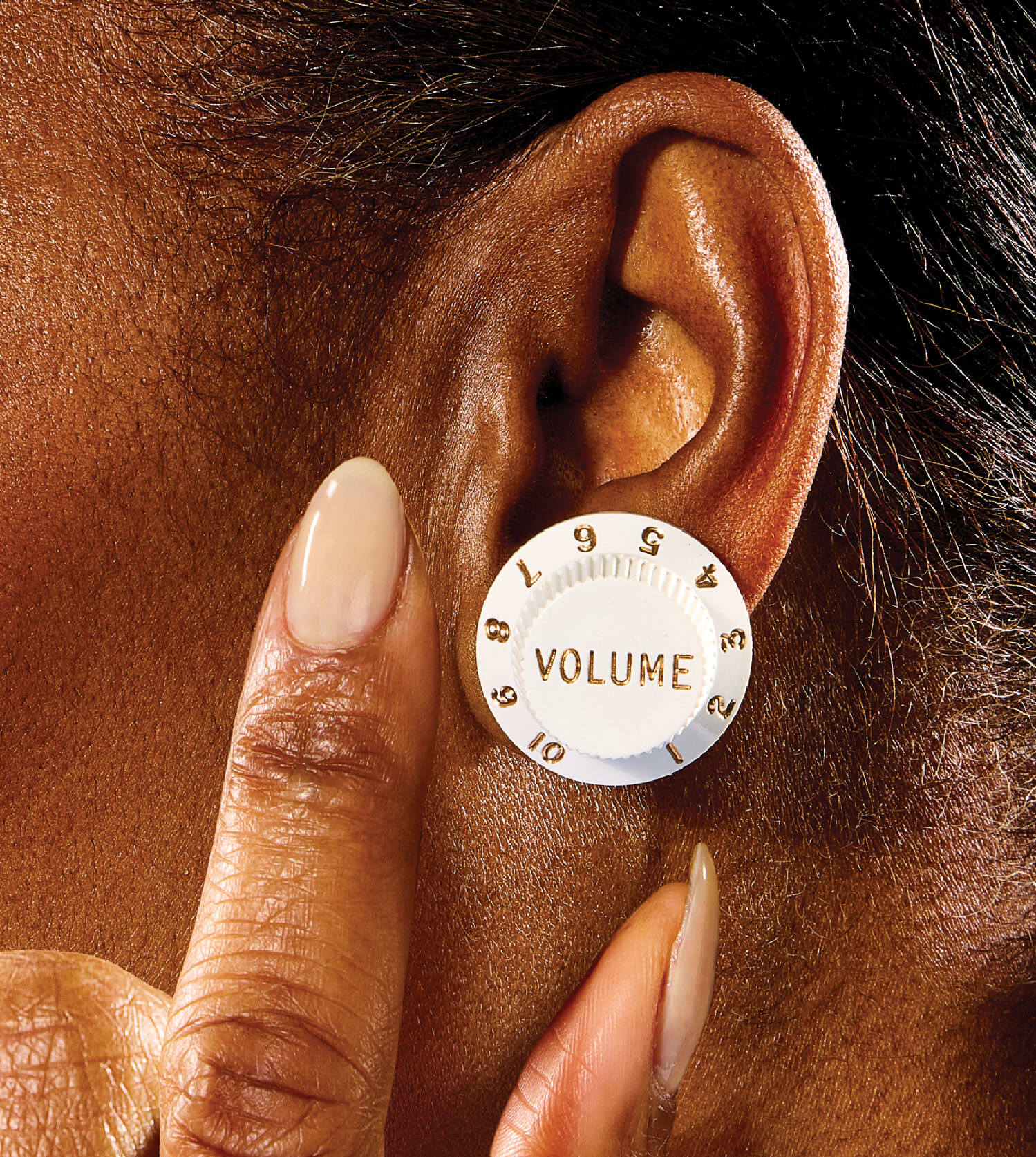
HEARING ISSUES were starting to crimp Andrew Blaise’s social life. “Conversations in noisy environments are harder to follow, especially in group settings or with background noise,” says the 54-year-old from Portland, Maine.* This has made going out to dinner with friends or joining in family gatherings more challenging, he says.
What to Expect in Your 50s:
“EVERYBODY'S HEARING slowly and gradually declines over our lifetimes,” says Frank Lin, M.D., director of the Cochlear Center for Hearing and Public Health at Johns Hopkins University in Baltimore. The cochlea, the part of the inner ear that transmits sound to the brain, contains cells that don’t regenerate. Over time those cells naturally die off, resulting in a gradual age-related hearing loss. By ages 55 to 64, an estimated 10 percent of U.S. adults have lost enough that hearing aids could be beneficial.
The pace at which hearing loss develops is different for each of us. Past sound exposure (think years of concerts or mowing the lawn without protection), family history and medication use (some drugs, like those used in chemotherapy, can damage ear cells) can all affect our hearing. Hearing loss is also cumulative: Your hearing status later in life is highly influenced by the events and experiences that happen across your lifespan, says Lori Pakulski, an audiologist and professor at the University of Toledo. “Two adults in their 50s with normal hearing thresholds may already be on a trajectory for very different hearing health later in life.”
“EVERYBODY'S HEARING SLOWLY AND GRADUALLY DECLINES OVER OUR LIFETIMES.”
—Frank Lin, M.D., Johns Hopkins
→ High frequencies begin to disappear. Gradual hearing loss begins as early as our 20s, with high frequencies the first to degrade, says Lin. But most of us don’t notice it until our 40s or 50s, in part because our brains do such a good job of compensating for diminished hearing by filling in the gaps, sometimes with the help of visual cues and lip movements.
→ It gets harder to distinguish between sounds. Once we reach our 50s, many people find that it’s more difficult to hear in noisy situations. “It sounds like people are mumbling at you; you’re leaning in more to hear,” says Lin, who at 48 is aware of this happening with him.
→ You may experience phantom sounds. About 1 in 8 people ages 45 to 64 develop tinnitus, a ringing, buzzing or roaring in the ears that can be temporary or permanent. The condition can be triggered by infections or medications but is often associated with hearing loss, as the brain can generate phantom sounds to compensate for reduced auditory function. An audiologist or otolaryngologist can suggest treatments like sound therapy or cognitive behavioral therapy.
BY AGE 64, AN ESTIMATED 10 PERCENT OF U.S. ADULTS HAVE SOME DISABLING HEARING LOSS.
→ You may need a hearing boost. Untreated, hearing loss can lead to depression, isolation, even cognitive decline. “When you have untreated hearing loss, your brain cells are less active,” says Leslie Soiles, chief audiologist at HearingLife, a national chain of audiology centers.
Less active brain cells? No, thank you. For mild loss, try hearing amplifiers, such as JLab's Hear OTC Hearing Aid & Earbuds, or AirPods Pro 2’s conversation boost feature, which Lin uses to hear conversations at noisy parties. Companies like EssilorLuxottica are making glasses with hearing boosting built in. Hearing aids are a lot less conspicuous these days and may reduce dementia risk by 50 percent in high-risk adults, according to one study. A 2023 study found OTC hearing aids just as effective as prescription aids for mild to moderate hearing loss.
*Name has been changed to protect privacy.
Protect Your Hearing
Sound advice you should listen to, now and in the future
NOW
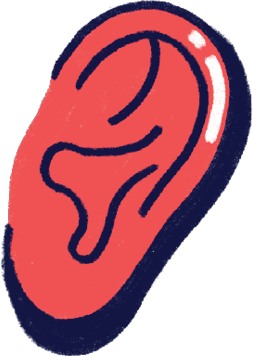
Establish a baseline. As an AARP member, you qualify for a free annual hearing assessment. Use your AARP login to register at nationalhearingtest.org.
Invest in high-quality earplugs. High-fidelity earplugs, like the ones musicians wear, block out loud noises but allow you to hear others. Loop, Decibullz, and Eargasm are popular brands.
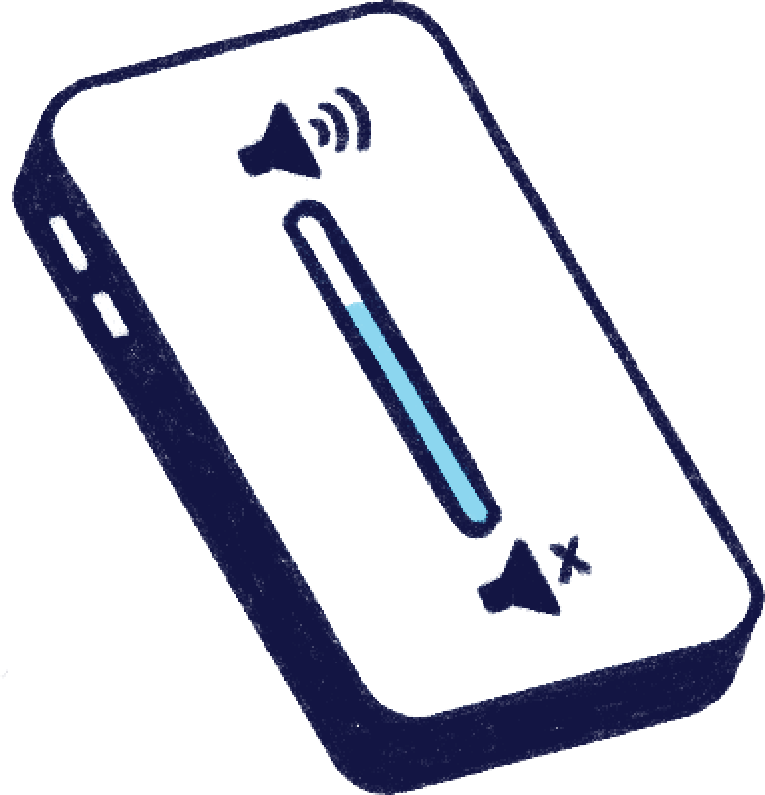
Download a decibel meter app, and use it to monitor sound levels (measured in decibels, or dB) around you. Try Decibel X, NIOSH Sound Level Meter or Sound Meter. Sound at 85 dB (lawn mower) can damage your hearing after eight hours. Every additional 3 dBs cuts your safe listening time in half.
DAILY
Check your phone’s volume settings. Set it to no more than 60 percent of the maximum levels. You can also download one of several apps that allow you to set volume limits on your phone.

Block the sirens. You’re not being paranoid plugging your ears when a fire truck goes by. A siren can expose you to 110- to 129 dB and cause damage in less than a minute.
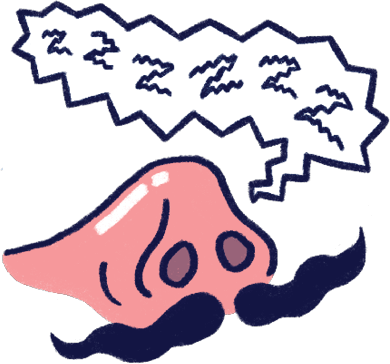
Take snoring seriously. Snoring can reach up to 100dB. If your partner saws logs, they may be harming their own hearing—and yours. Urge them to see a sleep specialist.
Know when you’re at risk. If you have to raise your voice to be heard at arm’s length away from somebody, that’s a situation where you’re going to want to protect your ears, says Lin.
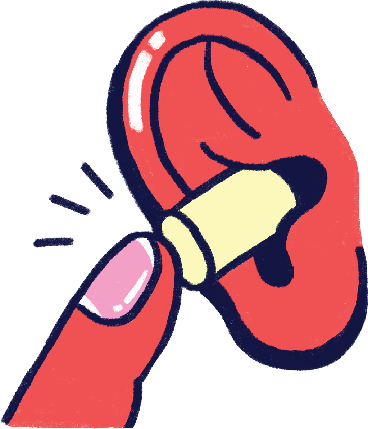
Use noise-canceling earbuds or headphones. They can be more expensive, but they allow you to listen to music or podcasts in a noisy environment without having to crank the volume. Apple, Samsung and Bose all offer them.

Eat a Mediterranean diet. One study found that adults 50 and up who reported eating a diet high in produce, nuts and beans had a 36 percent lower risk of high-frequency hearing loss. A diet rich in lean protein may also help ward off tinnitus.
Watch for side effects. Some common drugs, including loop diuretics for high blood pressure, antibiotics and some NSAIDs, can cause hearing loss. Talk with your doctor if you’re concerned. If you notice changes in hearing or balance, tell your doctor right away.
WEEKLY
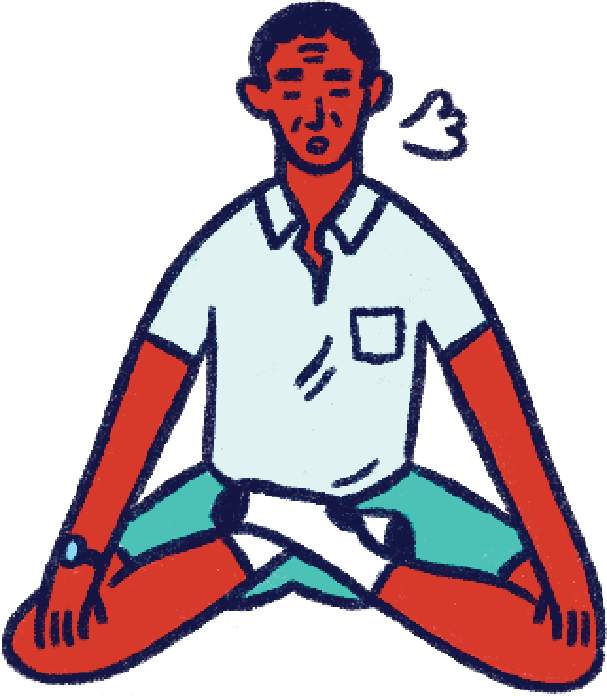
Take up a meditation practice. In one study, 50 percent of participants who engaged in an eight-week mindfulness meditation program noted reduced stress from tinnitus. (Stress can worsen symptoms.)
Establish an aerobic fitness plan. Research has shown that those with high cardiovascular fitness delayed the onset of noticeable hearing loss by approximately five years.
YEARLY
Keep up with hearing tests so you’re aware of how things are progressing. Visit an audiologist if you experience a noticeable decline.
TASTE & SMELL
SAVOR A LIFE OF SCENTS AND FLAVORS
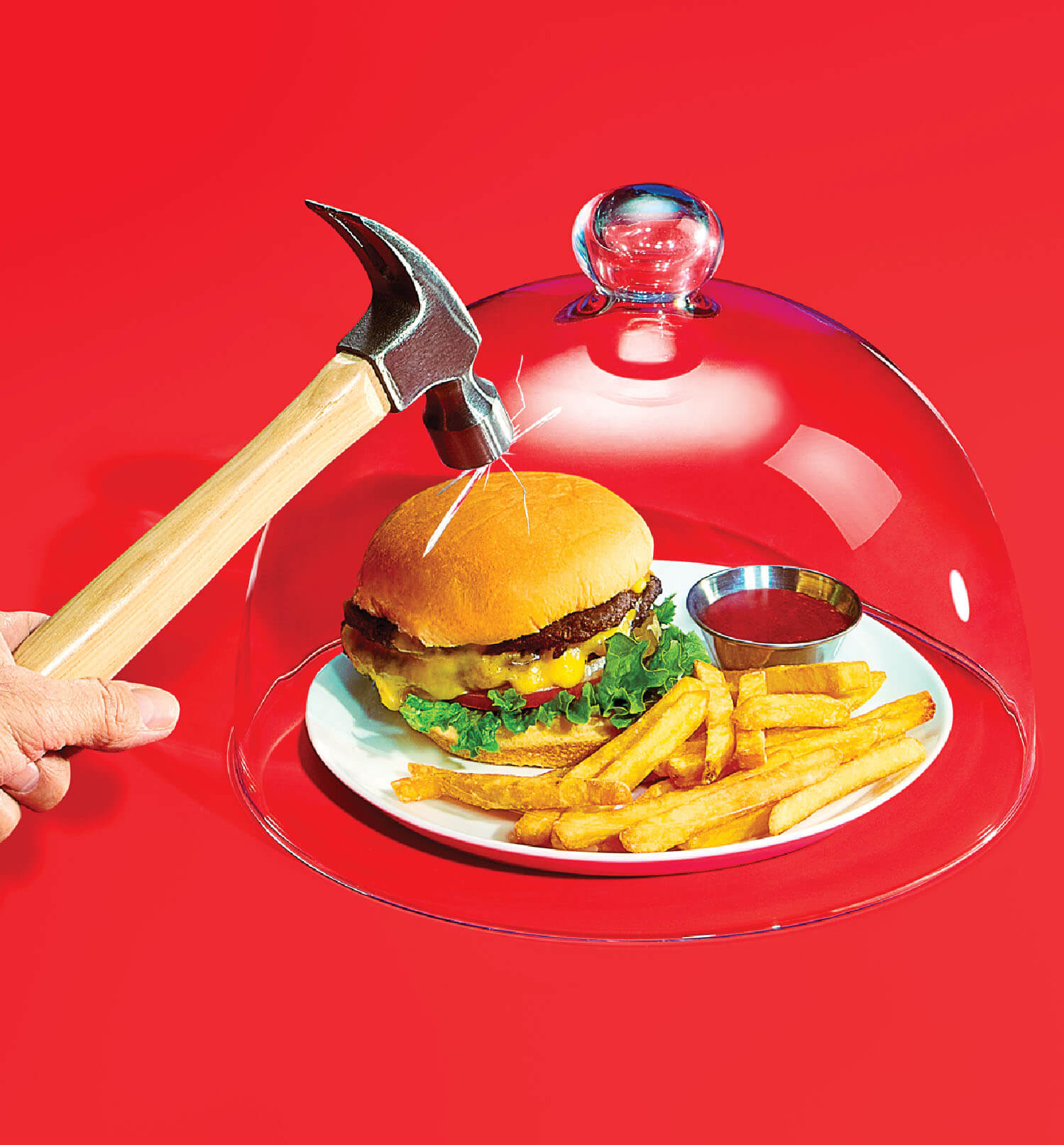
SOON AFTER turning 50, Robert Andrew noticed changes in the taste of foods. “At first, it was faint, as if the edges of flavors were softened, and everything appeared less colorful or tasty,” says the 54-year-old from East Providence, Rhode Island. The issue grew more noticeable over time, and he’s since realized that even his favorite meals no longer make him feel as satisfied as they used to. “Foods that I once enjoyed, such as a well-cooked steak or a favorite dessert, now seem more like textures with subtle taste undertones,” he says. To compensate for his diminished sense of taste, he focuses more on textures, preparing foods that are warm, creamy or crispy, which he says have helped to stimulate his senses. “I can still taste flavors, especially strong ones like citrus, chili or garlic, thanks to using more spices and condiments,” he adds.
What to Expect in Your 50s:
TASTE BUDS ON the tongue have cells that detect stimuli (sweet, salty, sour, bitter or savory), then transmit signals to the brain through your nerves, which process the taste in your central nervous system. But you can’t taste your food well without your sense of smell. It’s estimated that between 75 and 95 percent of what we perceive to be taste is actually our olfactory system doing its thing. (Many people reported losing their sense of taste after contracting COVID-19, but recent research suggests that the sense of smell, not taste, was the greater culprit.)
While you’re eating, smells from the food are released from the mouth into the nasal cavity, which plays a crucial role in helping you taste your food. “So many people who lose their sense of smell go to a doctor and say, ‘Oh, my food doesn’t taste like it used to.’ And this is most likely a misattribution,” says Valentina Parma, assistant director of the Monell Chemical Senses Center in Philadelphia. “People tend to lose their sense of smell, which affects the way we perceive flavor, and we tend to talk about it as if it were taste.” So if your sense of taste or smell diminishes, both of which can naturally happen with age, it’s likely you’ll notice a change in how foods taste.
→ Flavors may diminish. Over time, the number of taste buds on our tongues decrease. “As those taste buds disappear, we become less sensitive to flavors and develop a reduced sense of taste,” says Monica Mahajan, M.D., medical director of the Center for Better Aging at St. Bernard Hospital in Chicago. At the same time, existing taste buds become less effective at detecting flavors; you may notice that your favorite dessert has begun to taste less sweet. This can begin in our 50s, although women may notice it as early as their 40s. More than 70 percent of people ages 57 to 64 have measurable changes in their sense of taste.
“AS TASTE BUDS DISAPPEAR, WE BECOME LESS SENSITIVE TO FLAVORS AND DEVELOP A REDUCED SENSE OF TASTE.”
—Monica Mahajan, M.D., St. Bernard Hospital
→ Our noses become less sensitive. Your sense of smell comes from olfactory receptor neurons—nerve cells that detect odors, then send signals to the brain. These nerve cells start dying off in your 50s, and the process accelerates with age. (Some loss of smell can be temporary, like when you have a cold or COVID.)
→ Our mouths get drier. Decreased saliva production, which affects at least 10 percent of people over 50, can also affect taste. “You need saliva to dissolve flavor molecules to even reach your taste buds,” says Robert Eitches, M.D., an allergist and immunologist in the Los Angeles area. Reduced saliva can also be a side effect of certain medications, such as antidepressants, antihistamines, decongestants and diuretics. "Switch medications if your medication is contributing to dry mouth," says Eitches. "Chew on sugar-free gum or suck on sugar-free lozenges, and avoid marijuana, alcohol and caffeine," all of which can make your mouth dry, he says. Using a mouthwash designed for dry mouth can also help. A humidifier can improve moisture throughout.
Protect Your Taste and Smell
Some delicious kernels of advice for retaining your sense of yum.
DAILY

Stay hydrated. Dehydration can reduce the body’s ability to produce saliva, a crucial component of tasting. Fill up on H2O, and limit salt intake.

Treat colds and allergies. Allergies and colds cause inflammation in the nasal cavity and congestion that can impair your sense of smell. Antihistamines, saline rinses and nasal sprays can help to unblock your nose. (Follow directions on nasal sprays; overusing them can cause rebound congestion.)
Eat a nutrient-rich diet. B12, zinc, iron and copper deficiencies can alter taste sensations. Your doctor can test your nutrient levels and suggest ways to address any deficiencies affecting your taste perception.
Limit your exposure to toxins. Exposure to pollution can break down nasal cells over time, so if you live in an area with poor air quality or work with odor-emitting chemicals like solvents, investing in an air purifier may help.
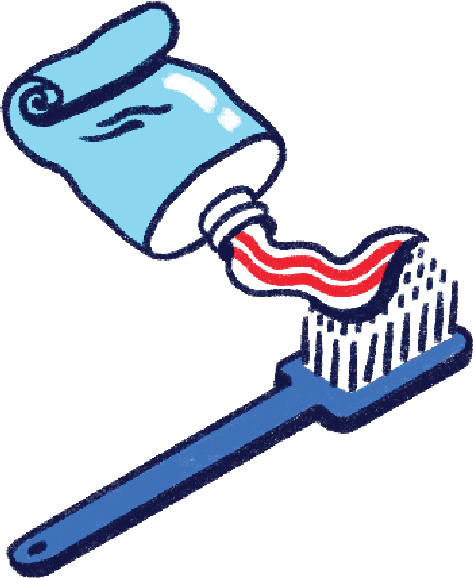
Brush and floss regularly. “Poor oral hygiene and diseases affecting the gums can alter taste sensations,” says Esther Verbovszky, a speech-language pathologist and founder of the Cleveland Feeding & Swallowing Center. Routine brushing and flossing can help.
WEEKLY

Retrain your nose. Studies suggest that repeated focus on certain scents may help train your brain to regain your sense of smell. Collect four scents from everyday life—for example, eucalyptus, rose, lemon, clove. Smell one for 15 seconds while trying to remember what it once smelled like. Rest for 10 seconds, then switch to each of the other three. Every few months, try another set of four.

Get out of your food rut. A loss of taste or smell can reduce interest in eating. Many older adults fall into food ruts, eating the same meals daily but missing out on variety. That’s an unhealthy situation because our bodies evolved to eat a wide variety of foods, all of which offer different nutrients. Stimulate your taste buds by mixing textures, colors and flavors. Try a cooking class, swap recipes with friends, or explore new dishes.
YEARLY

Keep up with your vaccines. Every time you get a cold, flu or bout of COVID, it takes a toll on your smell receptors, reducing their ability to regenerate, says Richard L. Doty, director of the Smell and Taste Center at the University of Pennsylvania Medical Center. In addition to vaccinations, he recommends limiting contact with people who are sick and prioritizing good sleep and a healthy diet.
TOUCH
DON’T LOSE THOSE LOVIN’ FEELINGS
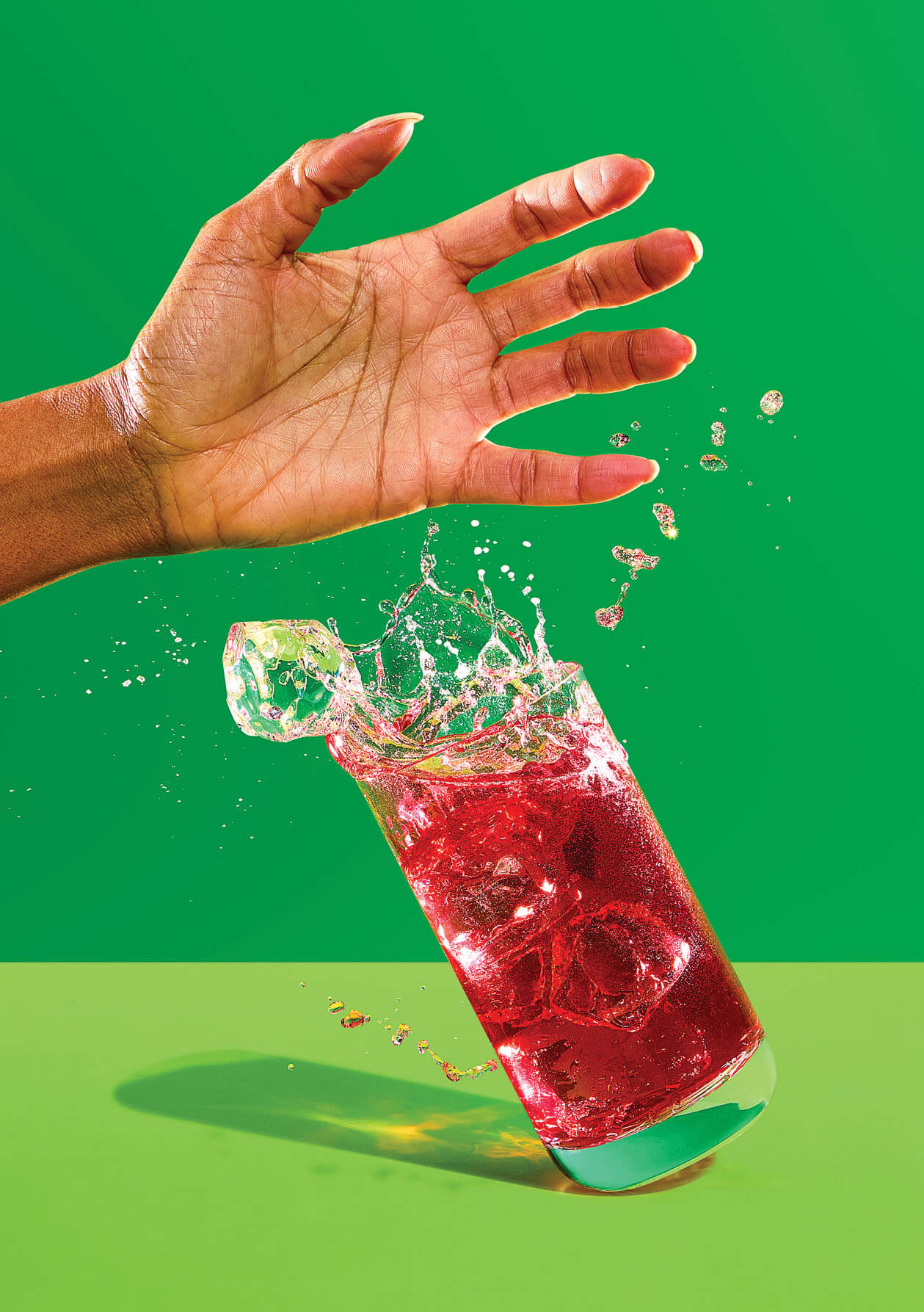
OVER THE PAST few years, Steven Fiore, M.D., an orthopedic surgeon in Midlothian, Virginia, has noticed a gradual dulling of his sense of touch. “It does affect me—sometimes when I grab a hot pan handle, I don’t feel the heat as quickly, which makes burns more of a risk,” says Fiore, 69. Swiping on his iPad has also become more difficult. “I need to press more deliberately,” adds Fiore. Hugs feel different too: “They’re less vivid, almost like there’s a barrier between me and the sensation.” This change, he says, has been frustrating, and he’s still trying to adapt.
Our sense of touch changes with age, but it’s not something most of us recognize, at least at first. When patients show up at the office of Ardeshir Hashmi, M.D., complaining of dropping objects, difficulties swiping on their devices or sustaining more household injuries, they may think it’s due to something like arthritis. But Hashmi, section chief of Cleveland Clinic’s Center for Geriatric Medicine, often finds these issues stem from reduced skin sensitivity and nervous system changes that can occur with age.
What to Expect in Your 50s:
ONE STUDY FOUND that among people 57 to 64, more than 60 percent had a measurable impairment in their sense of touch. This often appears initially as a bit of additional clumsiness or difficulty grasping objects.
→ You don’t perceive danger as quickly. As the largest organ in the body, our skin is packed with nerve receptors that allow us to feel pain, temperature and vibrations and help identify our body position within our environment. But starting in our 50s, these nerve receptors begin to change, with the nerve endings responsible for pain and temperature often changing first, Hashmi says. As a result, these nerve endings become less effective at providing us with the early warnings we need. “Often people either don’t notice it—or notice it in a very extreme circumstance,” he explains. “They try to pick up something really hot and end up burning themselves.” This could lead to increased household injuries, as you’re more likely to grab something and not feel that it’s hot enough or sharp enough to let go of as fast as you did in your younger years.
“OUR SENSATION IS CHANGING, AND WE'RE NOT AS NIMBLE.”
—Ardeshir Hashmi, M.D., Cleveland Clinic
→ You might become a bit more clumsy. A 2022 study found older adults tend to have slower tactile responses (the ability to feel and notice sensations on the skin, like pressure, temperature or texture). “Nerve conduction slows, meaning signals from the skin take longer to reach the brain,” says Raveesh Sunkara, a neurosurgeon in Hyderabad, India. The fingertips or soles of the feet—where touch receptors are highly concentrated—are the most affected, he says. “This is why older adults might struggle with activities requiring precise touch, like buttoning a shirt, or feel less stable when walking on uneven surfaces,” adds Sunkara. “Foot sensitivity often declines first, affecting balance and increasing fall risk.”
→ Screens may get harder to operate. Fine-motor movements are affected by age, Hashmi says. “Our sensation is changing, and we’re not as nimble.” This, combined with drier skin, can contribute to making operating touch-screen devices, typing and performing tasks that require fine-motor skills more difficult.
Protect Your Touch
Get your hands on these tactical tips and tricks
NOW
First, start with the common-sense stuff. Eat vegetables, fruit and lean protein to aid blood circulation to the tiny vessels in your skin. Maintain a healthy weight and avoid excessive alcohol.
Be sun smart. The sun doesn't cause just skin cancers and wrinkles; it also disrupts the receptors in our skin, which can lead to decreased sensitivity, adds Hashmi. He recommends wearing sunscreen and protecting yourself in extreme hot and cold temperatures.
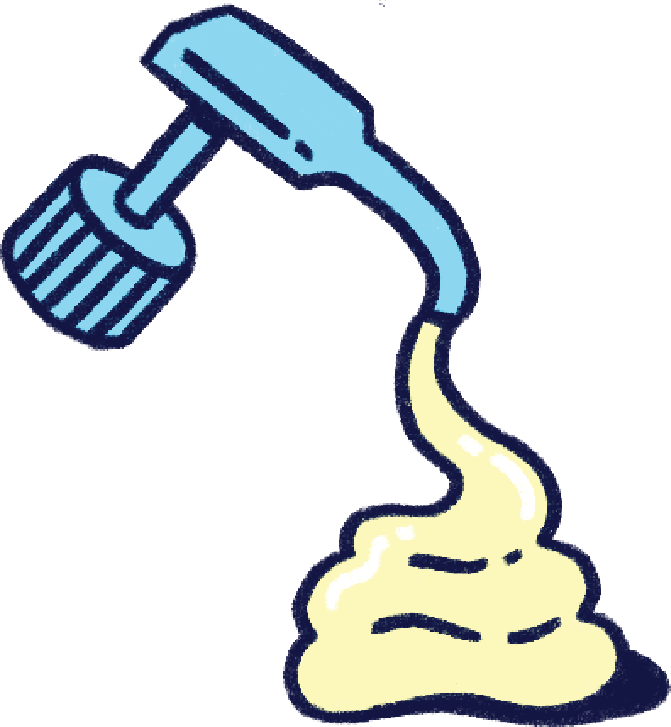
Give yourself a lotion-packed massage. One study found that hydrating the outermost layer of the skin significantly enhances tactile sensitivity. This is in part because the act of moisturizing our skin really helps improve the circulation going to the nerve endings, says Hashmi. He says to choose water- or oil-based lotions and to avoid those that contain alcohol, which can dry out the skin—the opposite effect of what we want.

Be tactically tactile. Handling textured objects may enhance touch sensitivity. Try practicing fine-motor tasks like shuffling cards, sewing, or playing an instrument that requires you to find your way by feel.
WEEKLY
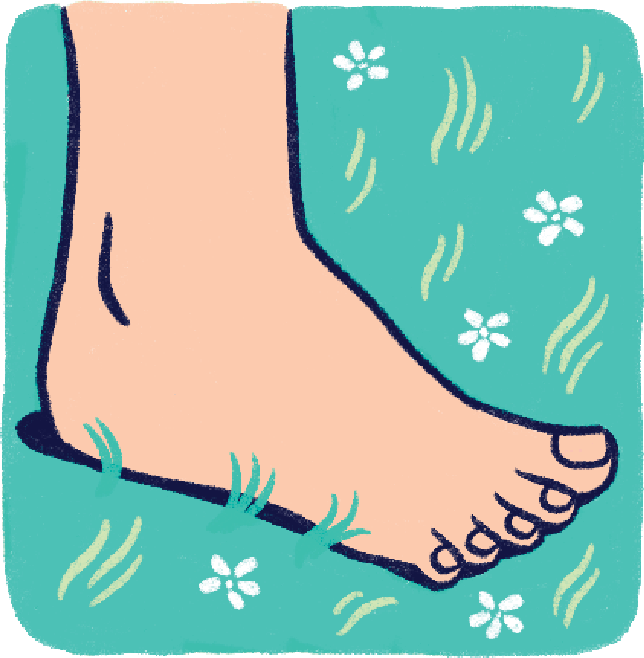
Practice your balance. A lack of feeling in the soles of the feet can hinder balance. Try balancing on one foot, then the other (make sure there’s a wall nearby to grab). And the same techniques you use to keep your hands sensitive can also work for your feet: Keep them moisturized, Hashmi recommends. And go barefoot more often, exposing your toes to different textures—carpeting, grass, sand—to help keep neural pathways active, says Sunkara.
YEARLY
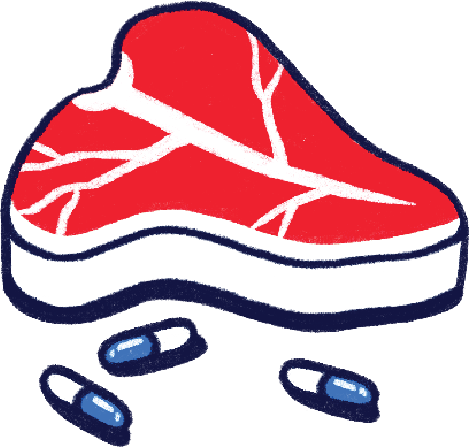
Check your 12. At your annual checkup, ask your doctor if it makes sense to test your B12 levels. Our bodies often have difficulty absorbing this crucial nutrient as we age. Your doctor can advise whether you should use a supplement.
Journalist Nicole Pajer has written for Self, Wired, Men’s Journal and other publications
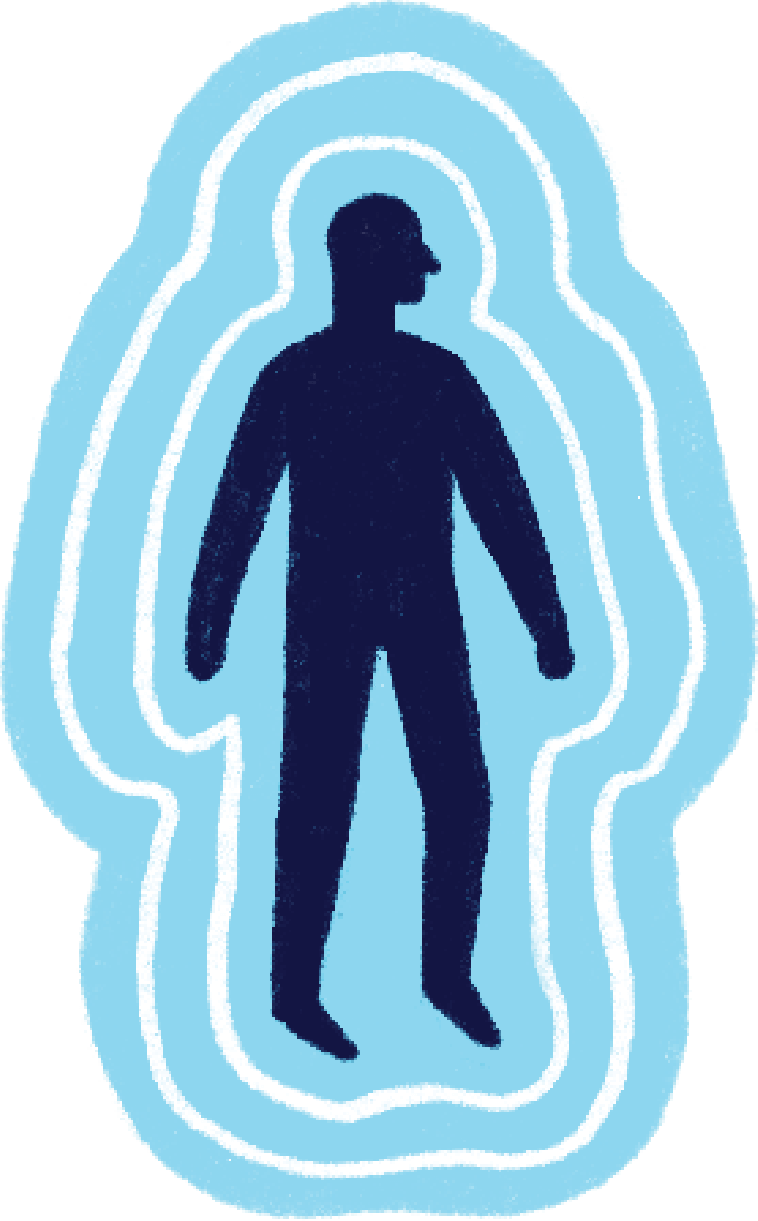
YOUR SIXTH SENSE
The sixth sense is just another way of understanding the world. And like our other senses, it changes with age.
SOME EXPERTS refer to our sixth sense as intuition or “gist,” as Laura L. Carstensen, professor of psychology at Stanford University, describes it: “You sort of get the general sense of something, right?, but are lacking details,” says Carstensen, who notes that research suggests this ability can amplify with age, as accumulated experiences allow us to find the signal and ignore the noise: In one study that Carstensen coauthored, older adults were less affected by negative emotions, which allowed them to make more accurate predictions.
Carstensen cites an example where older physicians working in emergency rooms are able to better assess a patient and immediately sense they need urgent treatment, while younger physicians might rely on a checklist to reach the same conclusion. “It’s more a feeling like This is OK, or a feeling that I need to do something about it,” she says. More lived experience, adds Carstensen, likely fine-tunes this in older adults. Her advice? Trust your gut intuition, but verify whenever you can. “Gist can be wrong,” she says.